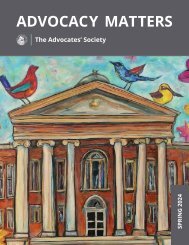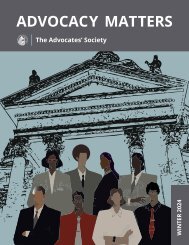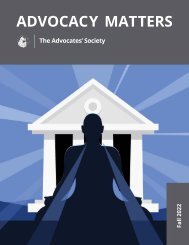Keeping-Tabs-Spring-2023
Stay up-to-date on news and events from our Young Advocates' Standing Committee (YASC) with Keeping Tabs.
Stay up-to-date on news and events from our Young Advocates' Standing Committee (YASC) with Keeping Tabs.
You also want an ePaper? Increase the reach of your titles
YUMPU automatically turns print PDFs into web optimized ePapers that Google loves.
Q. Could you give some background on your career before law school?<br />
A. I sometimes joke that I’m constantly trying to decide what I want to be when I grow up. I had<br />
always wanted to be a lawyer, since I was about twelve years old. But I’ve taken a couple of detours<br />
on the way there. I dropped out of university to become Executive Director of Youthquest!<br />
Lesbian and Gay Youth Society of British Columbia, which was a network of queer youth drop-in<br />
centres in suburban and small-town communities. After I finally completed my undergrad degree<br />
in Canadian Studies, I had an opportunity to work on an alternative dispute resolution program<br />
for survivors of Indian Residential Schools – that became the start of a fifteen-year odyssey on the<br />
national class action settlement.<br />
Q. How did working on the Indian Residential Schools Settlement Agreement shape how<br />
you viewed the law?<br />
A.The Indian Residential Schools Settlement Agreement demonstrated how law can provide a vehicle<br />
for remedying grave historical wrongs. The settlement, which included the Truth and Reconciliation<br />
Commission, has sparked a continuing national conversation on reconciliation. And the compensation<br />
part of the settlement, which I worked on, helped bring a measure of healing and closure to many of<br />
the people who suffered the most.<br />
INTERVIEW<br />
Interview with John Trueman,<br />
Associate, Allen/McMillan<br />
Litigation Counsel<br />
Compiled by Aly Haji, Lax O’Sullivan Lisus Gottlieb LLP<br />
However, my experience also underscored the importance of a legal profession that can understand<br />
and relate to the people it serves, and the need for regulators to take swift action to protect the<br />
integrity of the legal profession and the justice system when lawyers go off the rails. For example, we<br />
received complaints of lawyers setting up high-interest loans, charging fees above the court-ordered<br />
maximums, using unsupervised ‘form fillers’ to recruit clients, etc., and we ended up having to take action<br />
against some of these predatory practices. To be honest, seeing some of this unfold made me seriously<br />
question whether I wanted to be a lawyer. Today, I try to be mindful of the importance of building<br />
and maintaining trust: with clients, with opposing counsel, and with the bench.<br />
Q. How old were you when you started law school? What made you decide to go to law<br />
school as a mature student?<br />
A. I was 36 when I started law school in 2015. I had thought about it off and on for some time, but as<br />
the litigation work mushroomed — including two Supreme Court of Canada appeals — I realized it was<br />
time to get some actual qualifications.<br />
John Trueman is an Associate at Allen/McMillan Litigation Counsel in Vancouver, where he maintains a<br />
broad civil litigation practice with a focus on employment claims, administrative law, and appellate work.<br />
In addition to providing excellent service to his own clients, John works with the firm’s other lawyers on<br />
large, complex litigation matters in a variety of different subject areas. John is active in the community,<br />
having served as the Executive Director of Youthquest! Lesbian and Gay Youth Society of British Columbia,<br />
and as the Treasurer and Vice Chair of Mole Hill Community Housing Society. John lives with his<br />
partner in Vancouver and spends his free time travelling, skiing, and collecting modernist fountain pens.<br />
He has not yet started his post-modern fountain pen collection.<br />
Q. Going into law school, how did you intend to use your law degree? Has that differed from<br />
your practice today?<br />
A. My dream was to do primarily public law, and I was lucky to work with Joe Arvay, Q.C. for a brief time<br />
before he passed away. Today, I have a more diverse practice, including general civil litigation with specialties<br />
in administrative and employment law. About 70% of my work is with my own clients, which is<br />
incredibly satisfying. Ultimately, I think being a lawyer is about helping people solve problems, and it’s<br />
possible to do that really well even if you don’t have a Charter blockbuster on your hands. The other<br />
30% is working with senior counsel on larger files, and I feel really lucky to be at a firm with partners<br />
who are serious about getting junior lawyers into court and on their feet.<br />
14 15

















